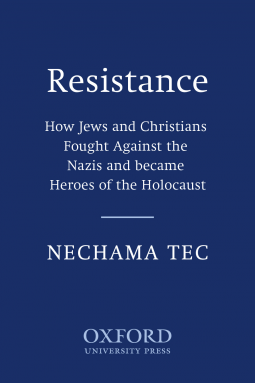
Resistance
How Jews and Christians Fought Against the Nazis and became Heroes of the Holocaust
by Nechama Tec
This title was previously available on NetGalley and is now archived.
Buy on Amazon
Buy on BN.com
Buy on Bookshop.org
*This page contains affiliate links, so we may earn a small commission when you make a purchase through links on our site at no additional cost to you.
Send NetGalley books directly to your Kindle or Kindle app
1
To read on a Kindle or Kindle app, please add kindle@netgalley.com as an approved email address to receive files in your Amazon account. Click here for step-by-step instructions.
2
Also find your Kindle email address within your Amazon account, and enter it here.
Pub Date Jun 04 2013 | Archive Date May 08 2013
Description
Nechama Tec's Defiance, an account
of a Jewish partisan unit that fought the Nazis in the Polish forests
during World War II, was turned into a major feature film. Yet despite
the attention this film brought to the topic of Jewish resistance, Tec,
who speaks widely about the Holocaust and the experience of Jews in
wartime Poland, still ran into the same question again and again: Why
didn't Jews fight back? To Tec, this question suggested that Jews were
somehow complicit in their own extermination. Despite works by Tec and
others, the stereotype of Jewish passivity in the Holocaust persists.
In Resistance, Tec draws on first-hand accounts, interviews, and other sources to reveal the full range of tactics employed to resist the Nazi regime in Poland. She compares Jewish and non-Jewish groups, showing that they faced vastly different conditions. The Jewish resistance had its own particular aims, especially the recovery of dignity and the salvation of lives. Tec explores the conditions necessary for resistance, including favorable topography, a supply of arms, and effective leadership, and dedicates the majority of the book to the stories of those who stood up and fought back in any way that they could. Emphasizing the centrality of cooperation to the Jewish and Polish resistance movements of World War II, Tec argues that resistance is more than not submitting--that it requires taking action, and demands cooperation with others. Whereas resilience is individual in orientation, Tec writes, resistance assumes others. Within this context, Tec explores life in the ghettoes, the organizations that arose within them, and the famous uprising in Warsaw that began on January 18, 1943. She tells of those who escaped to hide and fight as partisans in the forests, and considers the crucial role played by women who acted as couriers, carrying messages and supplies between the ghetto and the outside world. Tec also discusses resistance in concentration camps, vividly recounting the Auschwitz-Birkenau camp uprising on October 7, 1944. The refusal of the rebel leaders to give information under unspeakable torture, Tec displays, was just one more of the many forms resistance took.
Resistance is a rich book that forever shatters the myth of Jewish passivity in the face of annihilation.
In Resistance, Tec draws on first-hand accounts, interviews, and other sources to reveal the full range of tactics employed to resist the Nazi regime in Poland. She compares Jewish and non-Jewish groups, showing that they faced vastly different conditions. The Jewish resistance had its own particular aims, especially the recovery of dignity and the salvation of lives. Tec explores the conditions necessary for resistance, including favorable topography, a supply of arms, and effective leadership, and dedicates the majority of the book to the stories of those who stood up and fought back in any way that they could. Emphasizing the centrality of cooperation to the Jewish and Polish resistance movements of World War II, Tec argues that resistance is more than not submitting--that it requires taking action, and demands cooperation with others. Whereas resilience is individual in orientation, Tec writes, resistance assumes others. Within this context, Tec explores life in the ghettoes, the organizations that arose within them, and the famous uprising in Warsaw that began on January 18, 1943. She tells of those who escaped to hide and fight as partisans in the forests, and considers the crucial role played by women who acted as couriers, carrying messages and supplies between the ghetto and the outside world. Tec also discusses resistance in concentration camps, vividly recounting the Auschwitz-Birkenau camp uprising on October 7, 1944. The refusal of the rebel leaders to give information under unspeakable torture, Tec displays, was just one more of the many forms resistance took.
Resistance is a rich book that forever shatters the myth of Jewish passivity in the face of annihilation.
Available Editions
| EDITION | Hardcover |
| ISBN | 9780199735419 |
| PRICE | $27.95 (USD) |



